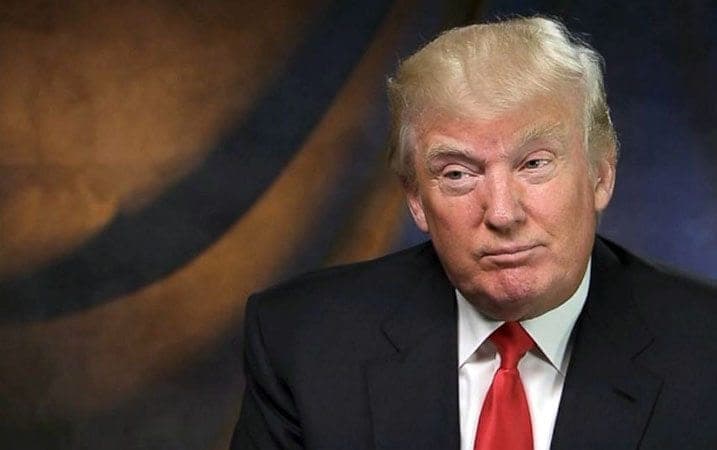EL PASO — Although Donald Trump is by no means a Catholic, a strange twist of fate nevertheless left the GOP frontrunner with a very bad Catholic day on Wednesday, watching his standing placed in jeopardy with both the Catholic right and left.
No matter the religious affiliation of a political candidate in America, he or she has to reckon with the fact that Catholics account for about 20 percent of the country’s voting-age population, and they’ve sided with the winner in most presidential elections.
A day in which one of those candidates managed to lose ground with both main ideological camps in America’s Catholic electorate, therefore, can’t be a good one.
On the right, Trump found himself facing questions about his anti-abortion credentials after an emotional press conference by Republican rival Ted Cruz, in which Cruz basically dared Trump to sue him over a South Carolina TV ad featuring 1999 video of Trump declaring himself “very pro-choice.”
Trump’s views have since evolved, and today he describes himself as anti-abortion. His legal team sent Cruz’s campaign a cease-and-desist order, to which Cruz responded that no court in the country would find him guilty of defamation for doing no more than quoting Trump’s own words.
Trump, in vintage fashion, fired back that he may sue not only over the ad, but also over whether Cruz is actually a natural-born Canadian citizen and thus ineligible for the presidency.
In any event, the ad by Cruz clearly is intended to persuade voters opposed to abortion rights that Trump is not really one of them.
The anti-abortion movement in the United States is hardly restricted to Catholic conservatives, but equally, opposition to legal abortion is a litmus test today for conservative Catholic identity, and probably no religious confession is as “all in” for the struggle against abortion than Catholicism.
That may not mean so much in South Carolina, where in total Catholics account for only 7 percent of the population, but it’s more important nationally, including in states where Republicans still have to contest primaries.
The Cruz/Trump kerfuffle over who’s more “pro-life” is also a reminder to faith-and-values voters that Trump’s credentials generally as a cultural conservative are open to question, including the fact that he’s been married three times.
At the same time, Trump, a Presbyterian, found himself in an indirect spat with the Vatican over Pope Francis’ stop on Wednesday at the US/Mexico border, where, standing just yards away in Mexico, the pontiff blessed a group of several hundred people, including undocumented immigrants, on the US side.
In the run-up to that event, Trump suggested that Francis wasn’t well informed about the problems illegal immigration poses for the United States, and that he was being exploited by Mexico to serve its own agenda.
On Tuesday night, a Vatican spokesman called Trump’s comments “very strange,” arguing that the pontiff talks about the human dignity of migrants and refugees everywhere he goes, and that he routinely makes these points to European leaders — a point, the Rev. Federico Lombardi added, Trump might better appreciate “if he came to Europe.”
Immigration has become a critical issue for Catholicism in America not merely for humanitarian reasons, but also because immigrants increasingly are the bedrock of the US Church. Estimates are that Hispanics, many recent immigrants, now represent one-third of US Catholics, and that by 2050, minority groups will surpass white Catholics in terms of numbers.
Generally, those minorities also have higher rates of faith and practice than white Catholics, helping drive the defense of immigrant rights to the top of the to-do list for many US Catholic bishops.
Granted, Trump is hardly the only Republican candidate who has struck a “get-tough” stance on immigration. He’s the one, however, who used an interview on Fox Business News to rip the pope, and he’s also the one who had his knuckles rapped by the Vatican as the pope was approaching the border.
For the Catholic left in America, concern for issues such as immigration, the poor, and the environment are every bit as defining as opposition to abortion and other “pro-life” issues are for the right. That’s not to mention a broad swath of moderate Catholic opinion equally concerned with all those positions.
While it’s clear the pope’s border stop on Wednesday was hardly directed specifically at Trump, it’s equally clear that Trump, who has proposed building an $8 billion wall along the border that would include the precise spot Francis was standing, can’t exactly claim an endorsement from it.
Trump may not be especially worried about any of this, since outreach to Catholic voters so far hasn’t been a cornerstone of his campaign.
Those Republican Catholics for whom religious seriousness and commitment are key concerns already may have made other choices. It’s especially open to question how much the rift with the Vatican and the pope over immigration will hurt, since most left-leaning Catholics were never going to back Trump under any circumstance.
That said, if Trump does manage to secure the Republican nomination, he’ll have to navigate a national landscape in which Americans are likely to be closely divided, and marginal shifts in one direction or another could have outsized consequences.
If even a handful of Catholics in key states decide either to vote against Trump, or to sit things out, because of perceptions that he’s not reliable on important Catholic concerns, it could spell the difference between Trump negotiating a revival of “The Apprentice” or measuring curtains for the White House.
More broadly, perhaps Wednesday may serve as a wake-up call to political candidates across the country about what it means to exude Catholic appeal. Being seen as pro-abortion rights isn’t a very good way to do it, and neither is being seen as anti-immigrant.
Somehow projecting both at once, however … well, that’s pretty much the Catholic Chernobyl.

















